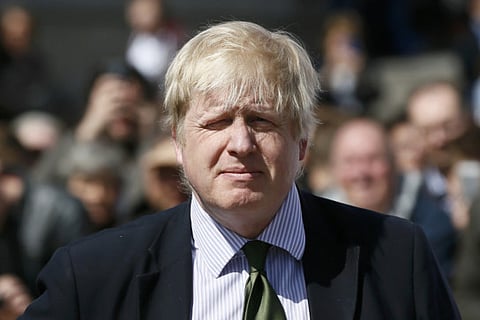Brexit yet another instance of dead-end thinking
One must realise that triumphant forays beyond Europe created Britain’s distinctive modern character and gave its prospering classes a sense of splendid uniqueness

There are no good reasons for Britain to leave the European Union. “Brexit” makes zero sense geopolitically or economically, as exasperated foreigners, including U.S. President Barack Obama, have repeatedly pointed out. But then, as with many political phenomena today, any explanation of the inexplicable Brexit campaign has to be sought deep in social, cultural and emotional history.
The impulse driving the Brexiteers is the same one former U.S. Secretary of State Dean Acheson highlighted in 1962, when he declared, “Great Britain has lost an empire and has not yet found a role.” The writer Edmund Wilson expressed it, too, when he said that the British elite was “completely unreconciled to the post-war diminishment of Britain.”
The members of Britain’s Conservative Party who would withdraw from the European Union share the same stubborn belief that their small island remains great enough to stand apart from continental Europe. To be sure, the original British sense of self-sufficiency, and of power and glory, was derived from historical facts. In the 18th century, Britain’s geographical isolation, as well as entwined traditions of commerce and individual liberty, clearly distinguished it from rivals on the turbulent continent. Those virtues made ardent Anglophiles out of even hard-headed men like Montesquieu and Voltaire.
Then in the 19th century, Britain’s industrial and commercial expansion reorganized the world into an economic unity, for better and for worse. British colonists, financiers, engineers, explorers, seamen, insurers and administrators broke down many of the geographical, social and economic barriers between continents. These triumphant forays into the world outside Europe both created Britain’s distinctive modern character and gave its prospering classes a sense of splendid uniqueness within a Europe racked by war and revolution.
This long experience of successful imperialism seeded many attitudes recognizable in today’s Brexit campaign. It bred a distrust of continental Europeans. Even the acute chronicler of London’s labouring poor Henry Mayhew wrote fearfully in 1862 of the “aliens” in London’s East End, “whom we had long welcomed and pampered in our midst” and who “swarmed westward in lawless, hungry multitudes.” Winston Churchill’s father opposed a proposed Channel Tunnel with France in the late 19th century by saying that “the reputation of England has hitherto depended upon her being, as it were, virgo intacta.”
The serene possession of a great empire created among elites some lasting mental and emotional dispositions, ranging from the “stiff upper lip” to an imperious self-absorption and poor understanding of the importance of diversity. E.M. Forster blamed the political problems of the British Empire in the early 20th century on superbly educated “public-school men” who “go forth” with “undeveloped hearts” into “a world that is not entirely composed of public-school men or even of Anglo-Saxons but of men who are as various as the sands of the sea.”
It could never have been easy for this frequently blundering but cosseted British ruling class to find a mere role after losing an empire. They’ve sought to keep the old flame alive through occasional neo-imperial adventures, from Suez to the Falklands to Iraq. As Education Minister, Michael Gove, a leading campaigner for Brexit, was obsessed with bringing school history syllabuses in line with the revisionist thinking of self-declared “neo-imperialists” Niall Ferguson and Andrew Roberts. Both Roberts and Ferguson lent their voices to the Iraq War, arguing that the British Empire was an “exemplary force for good,” and that imperialism was “an idea whose time has come again.”
In recent years, this passive-aggressiveness about the British Empire — a venture with often benign motives and agents but blighted by violence, racism and exploitation — has gone mainstream among a section of British right-wingers. Last week Boris Johnson even accused Obama of inheriting his Kenyan ancestors’ anti-imperialist animus against Britain. This was an extraordinarily intemperate attack by the outgoing mayor of London — the world’s most cosmopolitan city and a shining example of how Britain has done much better than any continental European country in accommodating its foreign-born population.
Brexit is little more than another instance of dead-end thinking by some empire fetishists, powered by the same delusion of a small island regaining its global power and influence. According to this Trump-lite view, isolation might just make Britain great again.
What proponents need to realise is that it’s truer now than when Acheson spoke in 1962 that Britain’s “attempt to play a separate power role — that is, a role apart from Europe, a role based on a ‘special relationship’ with the United States” is “about played out”. Empire has long been dead and there are no good reasons for Brexit — as opposed to a campaign, urgently needed, to exit the stultifying imperial mindset.
— Bloomberg
Pankaj Mishra is an Indian author and writer of literary and political essays.


